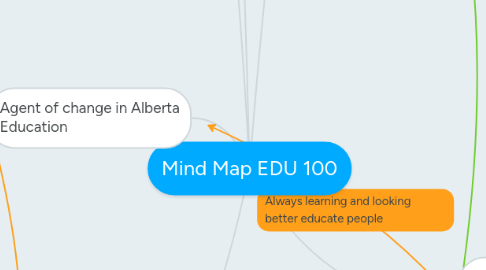
1. Alberta Education: (Alison, Gidney, Paquette, 1984) Responsibility of the government as stated in the Constitution of 1867
1.1. Alberta Teacher's Association: (Peters F, October 2014) Is a democratic institutions that represents the teachers of Alberta
1.1.1. Maintain and raise professional standards
1.1.2. Improve the quality of education
1.1.3. Provide teacher resources
1.1.4. Protect individual right
1.1.5. Provide specialized services
1.1.6. Lobby group for professionals
1.1.7. Maintain proper compensation for work done
1.1.8. Facilitate peer revitions
1.2. Public Education: Designed to give all students and equal opportunity to learn. It is compulsory, paid for by taxpayers, and free at the point of delivery. (Robinson 2010) and (Gidney, Lawr, 1980)
1.2.1. There is a certain amount of trust that is associated with enrolling in public education and an expectation in relation to the people responsible for your guide along your educational journey. (Yurick, September 2014)
1.3. School Boards: Elected representatives responsible for the maintenance and continuing development of the schools within their districts
1.4. University/college
1.4.1. Act outside and independently from the public education ministries and receives its money from paid tuitions
2. Current Issues/ Events
2.1. Teacher Behaviours Outside of Classrooms
2.1.1. Balance between personal will and professional standards
2.1.2. Free to live their life while still repeating themselves and their professional identity
2.1.3. Act in a way that will not be detrimental to your credibility in the community and in your classroom
2.1.4. Act in a way that you would want your children's teacher to act
2.2. Teacher's should not share their personal social media with current students.
2.2.1. It is important to respect the professional atmosphere of the classroom
2.2.2. You lack control over your social media if students are involved
2.2.3. Potentially strips the teacher of student respect and reduces their authority in the classroom
2.3. Should teachers have their credential review after a period of time
2.3.1. Recertification should be dealt with on an individual case bases and not necessarily on a period system however there should be some aspect of randomness to ensure sustained teacher development (Maheu, October 2014)
2.3.2. It would cost the taxpayers more money to re-certify the entire teaching staff every so often
2.3.3. Cause a lot of stress to the system say if one year a few teachers in your school are deemed unfit to teach
3. Profesionalism
3.1. Discrete body of knowledge which separates teachers from others
3.2. Formal period of preparation and professional development is required
3.3. Large degree of autonomy
3.4. High level of cooperation between between other professionals (teachers)
3.5. Has continuing involvement of the development of the profession itself
3.5.1. By identifying yourself as a reflective practitioner you are observe and solving problems
3.6. Serves a higher, greater social purpose
4. Agent of change in Alberta Education
5. Professional Identity
5.1. Classroom Management
5.1.1. Driekers Democratic Classroom: (Bucher, Manning, 2012) Teachers provide a collaborative learning environment when both teachers and students work towards achieving common goals in a democratic fashion
5.1.1.1. Identify the issue (Attention, power, revenge, and feelings of inadequacy)
5.1.1.2. Acting democratically as oppose to autocratically or permissively
5.1.1.3. Use logical consequences
5.1.1.4. Understand the differences between praise and encouragement
5.2. Psychology
5.2.1. Constructivism: (Loomis, Martin, 2014) Students build knowledge off of their existing and current experiences to construct their own perspective
5.2.1.1. Combine existing information with new information
5.2.1.2. New knowledge provides personal meaning
5.2.1.3. Learning does not occur from textbook to student of teacher to student, however from experience to student
5.3. Philosphy
5.3.1. Progressivism: (Loomis, Martin, 2014) An educational theory marked by emphasis on the individual child, informality of classroom procedure and encouragement of self expression
5.3.1.1. Inquiry based learning
5.3.1.2. Student participation is key
5.3.1.3. Heavily student based
5.3.1.4. Dewey, "Education is not to prepare for life, education is life"
